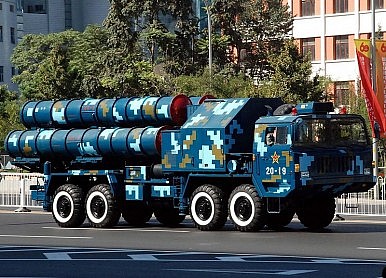ANKARA — The Turkish government and the country’s largest defense company are under increasing pressure from Turkey’s NATO allies to rethink a September decision to award a $3.44 billion air defense contract to a Chinese bidder.
Procurement officials have privately admitted that if Turkey finalizes the deal with the Chinese manufacturer, its entire defense cooperation effort with Western counterparts, including defense and non-defense companies, could be jeopardized.
“I think there is growing concern in Ankara over that deal,” one official familiar with the program said. “These concerns will definitely play a role in final decision-making, although they alone cannot be a reason to change course.”
Specifically, officials with Turkish company Aselsan are concerned that its connection to the deal could harm its corporate relations with Western banks.
In September, Turkey selected China Precision Machinery Import-Export Corp. (CPMIEC) to construct the country’s first long-range air and anti-missile defense system. The Turkish government said it opted for the Chinese solution based mainly on deliberations over price and technology transfer.
The Chinese contender defeated a US partnership of Raytheon and Lockheed Martin, offering the Patriot air defense system; Russia’s Rosoboronexport, marketing the S-300; and Italian-French consortium Eurosam, maker of the Aster 30.
Turkish officials said if contract negotiations with CPMIEC fail, talks would be opened with the second-place finisher, Eurosam. Next in line would be the US bidder. The Russian option has been eliminated.
But NATO and US officials have said any Chinese-built system could not be integrated with Turkey’s joint air defense assets with NATO and the United States.
They also have warned that any Turkish company that may act as local subcontractor in the program would face serious US sanctions because CPMIEC is on a US list of companies to be sanctioned under the Iran, North Korea and Syria Nonproliferation Act.
US diplomats have said Turkish companies working on US products or technology could be subject to intense scrutiny, or requested to adopt stringent security measures to erect a wall between US technology-related activities and CPMIEC.
They said the sanctions would be imposed on any company or individual cooperating with the blacklisted companies, especially when the use of US technology is in question.
In December, Aselsan, potentially CPMIEC’s main Turkish partner in the contract, became the first casualty of the US sanctions. Bank of America Merrill Lynch, a US investment bank, pulled out of a joint bid to advise Aselsan on its second listing on Istanbul’s stock exchange, citing Turkey’s contract negotiations with CPMIEC.
Aselsan’s management shrugged it off and said it would select another bank for the task.
But the procurement official said that Aselsan’s concern over corporate repercussions has increased.
“I think they now view the deal potentially punishing for the company,” he said.
One Aselsan official admitted that after Merrill Lynch’s pullout, the company has been in talks for the underwriting with two more international banks, Barclays and Goldman Sachs. Both have echoed the same concerns, pointing to possible US sanctions.
“The press reports over difficulties with these two banks are correct,” one Aselsan official confirmed on condition of anonymity. “Other investment banks do not look promising. We may wait for a better timing for the listing.”
The difficulties over a Chinese air and anti-missile defense architecture for NATO member Turkey also were discussed during French President François Hollande’s recent visit here.
French Defense Minister Jean-Yves Le Drian, who accompanied Hollande during the Jan. 27 visit, met with Murad Bayar, Turkey’s top defense procurement official.
“Inevitably, the program was discussed at the top level, with the French raising concerns and urging the Turkish government to rethink the deal,” one senior government official said.
Similarly, the same official said, the Americans are voicing their concerns on an almost daily basis through various channels.
He said he could not comment on how the diplomatic offensive is influencing the government’s decision.
The Turkish government has extended an end-of-January deadline for the US and European competitors to rebid for the contract.
The Turkish program consists of radar, launcher and interceptor missiles to counter enemy aircraft and missiles. Turkey has no long-range air defense system.
About half of Turkey’s network-based air defense picture has been paid for by NATO. The country is part of NATO’s Air Defense Ground Environment.
Without NATO’s consent, it will be impossible for Turkey to make the planned Chinese system operable with these assets, some analysts said.

